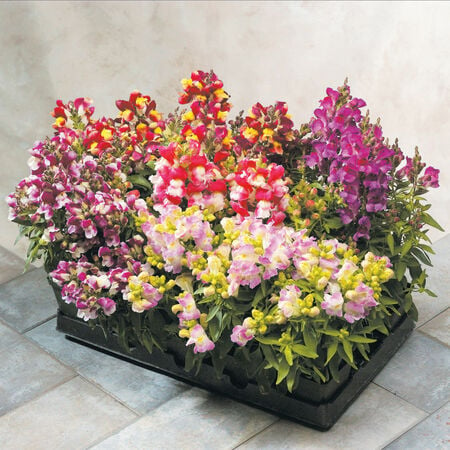Bicolor Mix Floral Showers, (F1) Snapdragon Seeds
Key Attributes
Key Attributes
Product Details
Weight
0.01Depth
0.15Height
4.5Width
3.25Plant Height
8-16"Botanical Name
Antirrhinum majus nanum pumilumFlower Height
8-10"Seed Type
SeedAdditional Characteristics
Attract Pollinators, Deer Resistant, Extended BloomsSeeds Per Gram
6,528Seeds Per Pound
2,960,000Packet
100 SeedsSow Depth
Top of SoilSeeds Per Ounce
185,000Breed
F1 HybridSun
Full Sun / Partial ShadeUses
Cut FlowersLife Cycle
AnnualSow Method
Direct Sow,TransplantCategories
FlowersDays To Maturity (# Days)
115Components
Growing Instructions
![]() Learning Download: How to Grow Snapdragons
Learning Download: How to Grow Snapdragons
Snapdragons are a popular, old-fashioned and cool-seasoned annual that produces sweet-smelling and long-lasting blooms on spikes.
Before Planting: To increase germination rates, some gardeners believe in freezing seeds for a few days before planting.
Planting: Plant Snapdragon seeds after the last hard frost, but they will tolerate a lighter frost. Plant in partial shade if you want to see them last through the summer and begin blooming again in the fall.
Watering: Keep well-watered throughout their growing season.
Fertilizer: Once established, Snapdragons are not heavy feeders. However, adding organic matter such as manure or compost to the bed will promote plant health.
Days to Maturity: Snapdragons continue to produce blooms from early to midsummer.
Harvesting: Cut the snapdragons at a 45-degree angle just above a leaf node. Cut them early in the day.
Tips: Deadheading will encourage more blooms and increase the blooming period.
Shipping Schedule
Our Seed Promise
 "Agriculture and seeds" provide the basis upon which our lives depend. We must protect this foundation as a safe and genetically stable source for future generations. For the benefit of all farmers, gardeners and consumers who want an alternative, we pledge that we do not knowingly buy or sell genetically engineered seeds or plants.
"Agriculture and seeds" provide the basis upon which our lives depend. We must protect this foundation as a safe and genetically stable source for future generations. For the benefit of all farmers, gardeners and consumers who want an alternative, we pledge that we do not knowingly buy or sell genetically engineered seeds or plants.
The mechanical transfer of genetic material outside of natural reproductive methods and between genera, families or kingdoms, poses great biological risks as well as economic, political, and cultural threats. We feel that genetically engineered varieties have been insufficiently tested prior to public release. More research and testing is necessary to further assess the potential risks of genetically engineered seeds. Further, we wish to support agricultural progress that leads to healthier soils, to genetically diverse agricultural ecosystems, and ultimately to healthy people and communities.
To learn more about the "Safe Seed Pledge" please visit www.councilforresponsiblegenetics.org.

